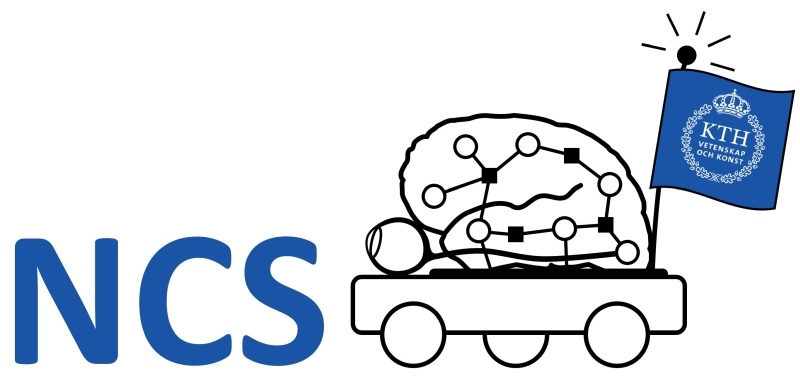1. Beräkning med neuroner
2. Lärande i neurala system
3. Händelsebaserad avkänning och beräkning
4. Neuromorf hårdvara
5. Neuromorf robotik
FDD3558 Lösa tekniska problemer med neural inspirerad beräkning 5,0 hp

Kursen presenterar neuromorfisk ingenjörskonst som en ny metod för beräkningssystem som hämtar inspiration från nervsystem för att bearbeta information i rum och tid. Vi kommer att ge studenterna den teoretiska bakgrund som krävs för att implementera rums-temporal beräkning i neuroner och omedelbart tillämpa den insikten i praktiken. Konkret diskuterar vi (1) beräkningsmodeller och lärande i decentraliserade och parallella neurala system, (2) presenterar state-of-the-art neuromorfa mjukvara och hårdvaruplattformar, och (3) introducerar neuromorfa sensorer och robotar. Kursen avslutas med ett omfattande individuellt utformat projekt för alla studenter.
Information per kursomgång
Kursomgångar saknas för aktuella eller kommande terminer.
Kursplan som PDF
Notera: all information från kursplanen visas i tillgängligt format på denna sida.
Kursplan FDD3558 (VT 2024–)Innehåll och lärandemål
Kursupplägg
Kursinnehåll
1. Beräkning med neuroner
2. Lärande i neurala system
3. Händelsebaserad avkänning och beräkning
4. Neuromorf hårdvara
5. Neuromorf robotik
Lärandemål
Efter avslutad kurs ska studenten kunna
(1) Beskriv beräkningsmodeller för läckande integratorer och läckande integrera-och-avfyra neuroner, samt sätt att representera och koda information med biofysiska modeller.
(2) Redogöra för anpassning och inlärning i neuromorfa neurala nätverk, inklusive övervakad optimering med hjälp av surrogatgradienter och oövervakade metoder, inklusive e-prop och EventProp.
(3) Förstå adress-händelsepresentationer och redogöra för funktionsprinciperna för händelsebaserade kameror och ställdon.
(4) Skriv och exekvera neuromorfa algoritmer på dedikerad neuromorf hårdvara.
(5) Analysera neuromorfa algoritmer kvantitativt och kvalitativt och redogöra för skillnader mellan neuromorfa och icke-neuromorfa algoritmer.
(6) Lös sensorbearbetning och sensorimotoriska problem med neuromorfa neurala nätverk.
(7) Implementera neuronal beräkning och maskininlärning som energieffektiva/energisparande processer.
Kurslitteratur och förberedelser
Särskild behörighet
Linear algebra (SF1604 eller liknande)
Machine learning (DD2421 eller liknande)
Artificial Neural Networks (DD2437 eller liknande, eller självstudier för att kompensera)
Rekommenderade förkunskaper
Linear algebra (SF1604 eller liknande)
Machine learning (DD2421 eller liknande)
Artificial Neural Networks (DD2437 eller liknande, eller självstudier för att kompensera)
Kurslitteratur
Examination och slutförande
Betygsskala
Examination
- ÖVN1 - Övningsuppgift, 1,0 hp, betygsskala: P, F
- PRO1 - Projektuppgift, 4,0 hp, betygsskala: P, F
Examinator beslutar, baserat på rekommendation från KTH:s handläggare av stöd till studenter med funktionsnedsättning, om eventuell anpassad examination för studenter med dokumenterad, varaktig funktionsnedsättning.
Examinator får medge annan examinationsform vid omexamination av enstaka studenter.
När kurs inte längre ges har student möjlighet att examineras under ytterligare två läsår.
Studenterna utför labbövningar för de 5 olika föreläsningsämnena. Minst fyra av de fem föreläsningsövningarna behöver vara genomförda.
Övriga krav för slutbetyg
Studenterna designar och genomför ett projekt inom neuromophic computing efter föreläsningarna. Projektet får betyget P/F.
Examinator
Etiskt förhållningssätt
- Vid grupparbete har alla i gruppen ansvar för gruppens arbete.
- Vid examination ska varje student ärligt redovisa hjälp som erhållits och källor som använts.
- Vid muntlig examination ska varje student kunna redogöra för hela uppgiften och hela lösningen.